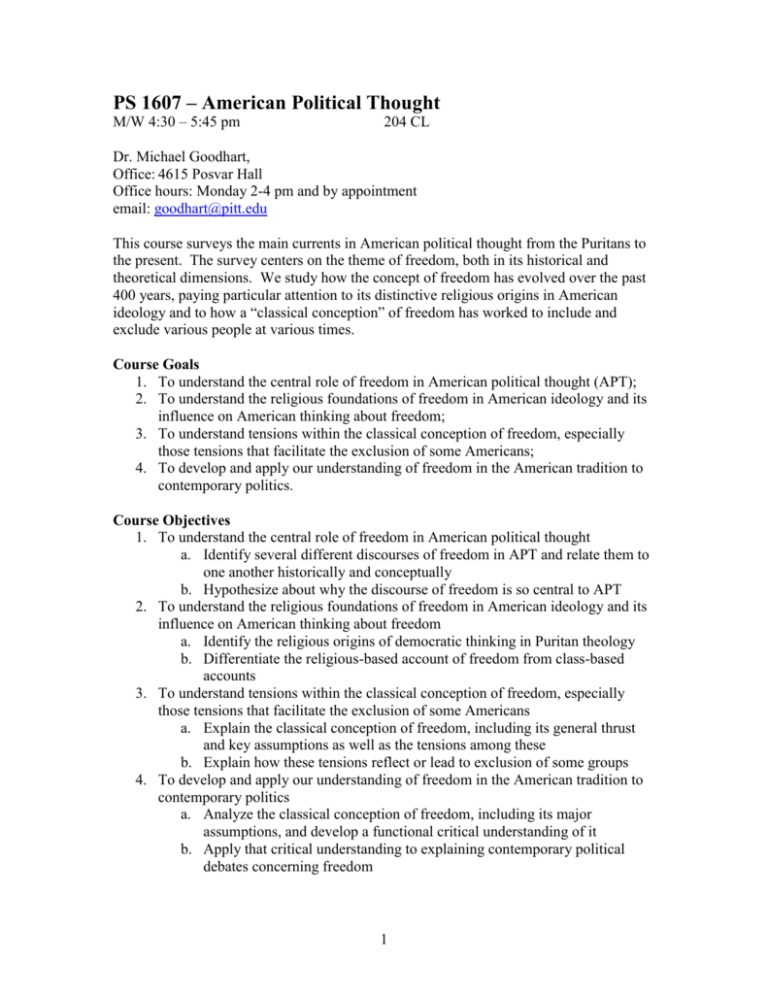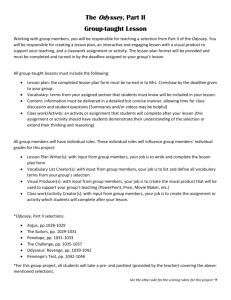PS 1607 * American Political Thought
advertisement

PS 1607 – American Political Thought M/W 4:30 – 5:45 pm 204 CL Dr. Michael Goodhart, Office: 4615 Posvar Hall Office hours: Monday 2-4 pm and by appointment email: goodhart@pitt.edu This course surveys the main currents in American political thought from the Puritans to the present. The survey centers on the theme of freedom, both in its historical and theoretical dimensions. We study how the concept of freedom has evolved over the past 400 years, paying particular attention to its distinctive religious origins in American ideology and to how a “classical conception” of freedom has worked to include and exclude various people at various times. Course Goals 1. To understand the central role of freedom in American political thought (APT); 2. To understand the religious foundations of freedom in American ideology and its influence on American thinking about freedom; 3. To understand tensions within the classical conception of freedom, especially those tensions that facilitate the exclusion of some Americans; 4. To develop and apply our understanding of freedom in the American tradition to contemporary politics. Course Objectives 1. To understand the central role of freedom in American political thought a. Identify several different discourses of freedom in APT and relate them to one another historically and conceptually b. Hypothesize about why the discourse of freedom is so central to APT 2. To understand the religious foundations of freedom in American ideology and its influence on American thinking about freedom a. Identify the religious origins of democratic thinking in Puritan theology b. Differentiate the religious-based account of freedom from class-based accounts 3. To understand tensions within the classical conception of freedom, especially those tensions that facilitate the exclusion of some Americans a. Explain the classical conception of freedom, including its general thrust and key assumptions as well as the tensions among these b. Explain how these tensions reflect or lead to exclusion of some groups 4. To develop and apply our understanding of freedom in the American tradition to contemporary politics a. Analyze the classical conception of freedom, including its major assumptions, and develop a functional critical understanding of it b. Apply that critical understanding to explaining contemporary political debates concerning freedom 1 Required Texts There are four required texts for this course; all are available at the book center. 1. Kenneth M. Dolbeare, American Political Thought (4th ed., Chatham House) 2. Henry David Thoreau, Walden; or, Life in the Woods (Dover Thrift Edition). 3. Robert Bork, Slouching Toward Gomorrah (Harper Books) 4. Dan Savage, Skipping Toward Gomorrah (Plume) WARNING: Dan Savage’s book Skipping Toward Gomorrah includes language and content that some might find offensive. If you do not wish to read this material, you may request an alternate set of readings for the final week of class. Please see me if you have any concerns about this. 5. There are also a number of texts to be accessed through courseweb (Course Documents) or directly on the web. These are older texts in the public domain. Course Policies Please read these policies carefully and make sure you understand them. If you have a disability for which you are or may be requesting an accommodation, please contact me and the Office of Disability Resources and Services as soon as possible. Their web page is http://www.drs.pitt.edu/. DRS is in 216 William Pitt Union, (412) 648-7890/(412) 383-7355 (TTY). They will verify your disability and set reasonable accommodations. See the complete policy at http://www.drs.pitt.edu/policies.html#academic. 1. 2. No late papers are accepted. All assignments and due dates are available at the start of the term. If you do not turn in assignments on the day and at the time they are due, you receive an F for the assignment. There are only two exceptions to this policy: a. If you have a signed medical note from a physician stating that you were physically unable to perform school work for at least three days prior to the due date. NOTE: a printout saying you stopped by student health does not qualify. Your note must be signed and it must explain why you were unable to complete the assignment. b. If a member of your immediate family dies, you may be excused if you provide documentation of the event – a dated funeral program, an obituary, a note from a religious leader on official letterhead, etc. “My aunt died” doesn’t cut it. c. If you anticipate any problem, please contact me in advance. I will be happy to make reasonable accommodations. Cheating a. Students caught cheating – turning in work that is not their own – will fail the course and be referred to the Dean. I do not tolerate cheating – it is insulting to me and your classmates and degrading to you. 2 3. b. If you have any questions about what constitutes academic dishonesty, ASK. Ignorance is no excuse. You can also consult the Pitt website for more information: http://www.fcas.pitt.edu/academicintegrity.html General courtesy a. Be on time. If you cannot arrive to class on time, don’t come. b. Try not to get up in the middle of class, or wander in and out of the room; this is extremely distracting for the instructor and your classmates. c. Please remember to turn off your cellphones before class d. Please do not use the internet during class e. To ensure open and honest discussion, please do not record any portion of the class. Why I maintain these policies. These policies might seem harsh to some of you. I don’t intend them to be. Rather, they are the minimum that is required to create civility and equity among members of the class. More importantly, they are the minimum required for the level of self-respect necessary for ethical and intellectual growth. The philosopher Montaigne implores us: “Make yourself into the kind of person in whose sight you would not want to walk awry. Feel shame for yourself; feel respect for yourself.” These policies help us along the path toward Montaigne’s ideal, and they free me from the moral hazard of assessing the veracity and existential weight of individuals’ personal traumas. IF YOU ARE HAVING PROBLEMS, WITH THIS CLASS, OR WITH LIFE, COME TALK TO ME. Don’t wait until the problem becomes an academic issue. I am happy to help if I can, but I can’t help if you don’t let me know there is a problem Miscellany 1. Participation. The value of your education is largely determined by you. The more questions you ask, the more engaged you become, the more you will learn, and the more learning will excite you. a. Discussion i. Everyone is encouraged to speak up – ESPECIALLY if you disagree with what I or one of your classmates have said. ii. Please listen respectfully to the opinions of others and please, when you speak, try to be loud, brief, and on topic. b. Questions. I know it is sometimes difficult for students to ask questions. But I can assure you that in a class this size you are not the only person who has a particular question (or a related one). You do yourself and others a service by asking. 2. Preparation a. This course assumes a basic (AP or college intro-level) knowledge of American history. If you lack this or need to brush up, consult any basic American history text. b. I strongly recommend that you read a national newspaper (the New York Times, the Wall Street Journal, the Washington Post) regularly this 3 semester (and always). You will get more out of the class (I will make frequent references to the news) and out of life if you are well-informed. CNN or Fox News are not substitutes; they cover barely a tenth of the news carried by these papers. Course Assignments The course grade is based on 1,000 points. Points will be awarded as follows: Assignment Participation Homework 1 Homework 2 Homework 3 Homework 4 Homework 5 Final Paper Points 150 100 100 100 100 100 350 Percentage of grade 15 10 10 10 10 10 35 Assignments All of the graded assignments for this course build toward the Final Paper, which is the main piece of work you will submit. The Homework assignments ask you to identify the main themes and arguments of a particular unit of the course (explicit instructions are provided on each Homework handout). In the case of Homework 1, this means identifying the key elements in the classical conception of freedom, describing their philosophical foundations, and noting their limits. For Homeworks 2-5, you will also be asked to identify the key elements in each of four critiques of the classical conception, in the same format as in Homework 1, and also to highlight the main areas of disagreement with or criticism of the classical conception of freedom. The Final Paper requires you to utilize all of the skills practiced in the Homeworks as well as to synthesize and make use of the knowledge built up through them. It asks you to construct an argument evaluating an important contemporary debate over the meaning of freedom and to situate it within the larger discourse of freedom in America. More detailed instructions accompany each Homework assignment and the Final Paper. Homework 1 (100 points, due Tues. 10/9). On the classical conception of freedom. Homework 2 (100 points, due Wed. 10/24). On the transcendentalists. Homework 3 (100 points, due Mon. 11/5). On the social and economic critics. Homework 4 (100 points, due Wed. 11/14). On the African-American critics. Homework 5 (100 points, due Wed. 11/28). On the feminist critics. Final Paper (350 points, due Thursday Dec. 13 at Noon in the Political Science main office). This 2,000 word (+/-) paper will assess whether Robert Bork or Dan Savage 4 presents a more authentically American idea of freedom. Detailed instructions will be included on a handout distributed at the beginning of April. Participation (150 points, throughout the term). There are three ways you can earn points: 1. Come to office hours. You can earn 30 points by coming to office hours – even if just to say hello. There is no limit on how often you can come to office hours (but you only earn points once)! 2. Ask a question or make a comment in class. You will receive 10 points for asking or answering a question in class or for making a comment as part of a class discussion. To receive points, hand me a slip of paper (not a full sheet, just a scrap is fine) at the end of a class in which you ask a question or make a comment. Include your full name and a brief cue to remind me about the nature of your comment. 3. Listen and reflect. You can receive 20 points for submitting a one or twoparagraph reflection on some aspect of the discussion from the previous class session. These must be typed; you can give them to me at the next class; please include your name and a brief cue regarding the aspect of the discussion that prompted your reflection. These reflections must be thoughtful– no credit for slapping something down on paper! (Maximum one per week; not available after Thanksgiving.) 4. LOSE 10 POINTS if I find you texting, surfing, or otherwise NOT participating. Course Schedule It is essential that you read the assigned texts by the date they appear on the syllabus. My lectures will not always explain the texts or walk through the arguments; I will sometimes lecture based on the assumption that you have read and understood the texts assigned for that day. If you read in advance it also makes it possible for us to proceed in Socratic fashion rather than through straight lecture. Monday 8/27 Introduction, policies, etc. Prologue: The Puritans Wednesday 8/29 The Charter of New England: 1620 (in Course Documents) http://www.yale.edu/lawweb/avalon/states/mass01.htm William Bradford, from History of Plymouth Plantation (in Course Documents) http://www.fordham.edu/halsall/mod/1650bradford.html Fundamental Agreement, or Original Constitution of the Colony of New Haven (in Course Documents) http://www.yale.edu/lawweb/avalon/states/ct01.htm 5 The Massachusetts Body of Liberties (1641) (in Course Documents) http://history.hanover.edu/texts/masslib.htm Covenants of New England (in Course Documents) http://personal.pitnet.net/primarysources/covenants.html#salem36 -----------------------------------------------------------------------------------------Monday 9/3 No class – happy Labor Day! -----------------------------------------------------------------------------------------Wednesday 9/5 John Cotton, Sermon at Salem, 1636 (in Course Documents) http://louisville.edu/a-s/english/subcultures/colors/black/tjcarn01/Reverend.html John Winthrop, A Model of Christian Charity (in Course Documents) http://www.animatedatlas.com/ecolonies/winthrop-charity.html John Winthrop, The Little Speech (in Dolbeare) “This World and the Next,” selections from The American Puritans (in Course Documents) Roger Williams – A Plea for Religious Liberty (in Course Documents) John Wise, Democracy is Founded in Scripture (in Dolbeare) Act I: The Classical Conception of Freedom Monday 9/10 Benjamin Franklin, selections (in Dolbeare); selections from the autobiography (in Course Documents) Samuel Adams, The Rights of the Colonists (in Dolbeare) Thomas Paine, Common Sense; The Crisis (in Dolbeare) Thomas Jefferson, The Declaration of Independence (in Dolbeare) ----------------------------------------------------------------------------------------Wednesday 9/12 John Adams, selections (in Dolbeare) 6 The Constitution of the United States (in Dolbeare) Thomas Paine, The Rights of Man (in Dolbeare) ----------------------------------------------------------------------------------------Monday 9/17 In favor of Adoption of the Constitution (in Dolbeare) Against Adoption of the Constitution (in Dolbeare) ----------------------------------------------------------------------------------------Wednesday 9/19 Alexander Hamilton’s Program (in Dolbeare) Thomas Jefferson: Principles and Program (in Dolbeare) ----------------------------------------------------------------------------------------Monday 9/24 Abraham Lincoln, selections, except Gettysburg Address (in Dolbeare) The Civil War Amendments, 13th-15th (in Dolbeare) ----------------------------------------------------------------------------------------Wednesday 9/26 Abraham Lincoln, The Gettysburg Address (in Dolbeare) ----------------------------------------------------------------------------------------Monday 10/1 William Graham Sumner “What Social Classes Owe to Each Other” (in Dolbeare) Andrew Carnegie, “Wealth” (in Dolbeare) Herbert Croly, The Promise of American Life (in Dolbeare) Progressivism (in Dolbeare) Woodrow Wilson, The Meaning of Democracy (in Dolbeare) ----------------------------------------------------------------------------------------- 7 Wednesday 10/3 Franklin D. Roosevelt, selections (in Dolbeare) Roosevelt and Winston Churchill, The Atlantic Charter (in Course Documents) http://usinfo.state.gov/usa/infousa/facts/democrac/53.htm John F. Kennedy, Inaugural Address (in Dolbeare) Ronald Reagan, selections (in Dolbeare) ----------------------------------------------------------------------------------------Tuesday 10/9 Homework 1 due at start of class In-class review of Homework 1. ----------------------------------------------------------------------------------------Act II: Transcendentalism Wednesday 10/10 Ralph Waldo Emerson, The Divinity School Address; The Over-soul; SelfReliance (in Course Documents) Henry David Thoreau, Civil Disobedience (in Dolbeare) ----------------------------------------------------------------------------------------Monday 10/15 Henry David Thoreau, Walden (pp. 1-108) ----------------------------------------------------------------------------------------Wednesday 10/17 Henry David Thoreau, Walden (pp. 109-216) ----------------------------------------------------------------------------------------- 8 Act III: Economic and Social Critics Monday 10/22 Orestes Brownson, The Laboring Classes (in Dolbeare) George Fitzhugh, Cannibals All! (in Dolbeare) ----------------------------------------------------------------------------------------Wednesday 10/24 Homework 2 due at start of class Populism, in Dolbeare Emma Goldman, Anarchism: What it Really Stands For (in Dolbeare) Eugene Debs, Revolutionary Socialism; Speech to the Jury (in Dolbeare) ---------------------------------------------------------------------------------------Monday 10/29 Students for a Democratic Society, The Port Huron Statement (in Dolbeare) Christopher Lasch, The Culture of Narcissism (in Dolbeare) National Conference of Catholic Bishops, “Economic Justice for All” (in Dolbeare) ---------------------------------------------------------------------------------------ACT IV: African-American Critics Wednesday 10/31 Benjamin Rush, selections (in Dolbeare) William Lloyd Garrison, “Declaration of Sentiments of the American AntiSlavery Society” (in Dolbeare) Frederick Douglass, selections (in Dolbeare) ---------------------------------------------------------------------------------------- 9 Monday 11/5 Homework 3 due at start of class. Booker T. Washington, selections (in Course Documents) W.E.B. Du Bois, The Souls of Black Folk (in Dolbeare); selections (in Course Documents) ---------------------------------------------------------------------------------------Wednesday 11/7 Langston Hughes, selected poems (in Dolbeare) Martin Luther King, Jr. Letter from the Birmingham City Jail (in Dolbeare) Malcolm X, The Ballot or the Bullet (in Course Documents) http://www.americanrhetoric.com/speeches/malcolmxballotorbullet.htm Stokely Carmichael, “What We Want” (in Course Documents) ---------------------------------------------------------------------------------------Act V: Feminist Critics Monday 11/12 Margaret Fuller,The Great Lawsuit (in Course Documents) Elizabeth Cady Stanton, selections (in Dolbeare) Susan B. Anthony, selections (in Dolbeare, 294-301); “Woman Wants Bread, not the Ballot” (in Course Documents) Sojourner Truth, “Ain’t I a woman?” (in Course Documents) ---------------------------------------------------------------------------------------Wednesday 11/14 Homework 4 due at start of class Emma Goldman, the Tragedy of Woman’s Emancipation (in Dolbeare) ---------------------------------------------------------------------------------------Monday 11/19 Charlotte Perkins Gillman, The Yellow Wallpaper (in Course Documents) Betty Friedan, Our Revolution is Unique (in Dolbeare) NOW Statement of Purpose (in Course Documents) 10 Kate Millett, Sexual Politics (in Course Documents) ---------------------------------------------------------------------------------------Wednesday 11/21 – No class – Happy Thanksgiving! (You might want to start reading Bork and Savage this weekend to get ahead before the finals crunch.) ---------------------------------------------------------------------------------------Epilogue: Contemporary Debates Monday 11/26 William Butler Yeats, The Second Coming (in Bork) Robert Bork, Slouching Towards Gomorrah, Intro, chapters 1-5, 7 ---------------------------------------------------------------------------------------Wednesday 11/28 Homework 5 due at start of class Robert Bork, Slouching Towards Gomorrah, chapters 8-17 ---------------------------------------------------------------------------------------Monday 12/3 Dan Savage, Skipping Towards Gomorrah, pp. 1-182 ---------------------------------------------------------------------------------------Wednesday 12/5 Dan Savage, Skipping Towards Gomorrah, pp.183-300 ---------------------------------------------------------------------------------------Final Paper Due Thursday Dec. 13 at Noon in the Political Science main office (fourth floor of Posvar Hall, at the top of the escalator). There will be a box with the course name and number, and my name, just inside the main entrance. 11





